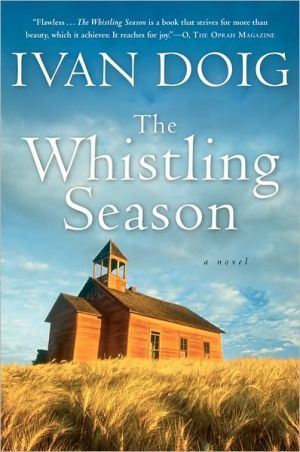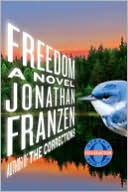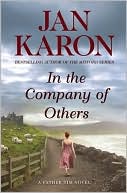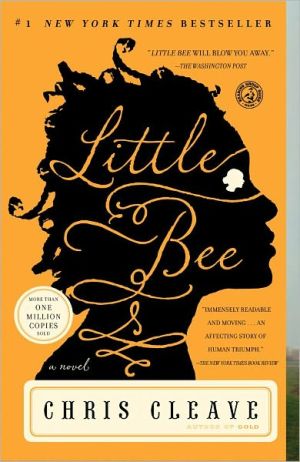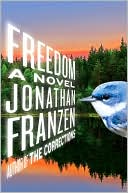The Whistling Season
Novelist Ivan Doig revisits the American west in the early twentieth century, bringing to life the eccentric individuals and idiosyncratic institutions that made it thrive.\ “Can't cook but doesn't bite." So begins the newspaper ad offering the services of an "A-1 housekeeper, sound morals, exceptional disposition" that draws the attention of widower Oliver Milliron in the fall of 1909. That unforgettable season deposits the ever-whistling Rose Llewellyn and her font-of-knowledge brother,...
Search in google:
"Can’t cook but doesn’t bite." So begins the newspaper ad offering the services of an "A-1 housekeeper, sound morals, exceptional disposition" that draws the hungry attention of widower Oliver Milliron in the fall of 1909. And so begins the unforgettable season that deposits the noncooking, nonbiting, ever-whistling Rose Llewellyn and her font-of-knowledge brother, Morris Morgan, in Marias Coulee along with a stampede of homesteaders drawn by the promise of the Big Ditch—a gargantuan irrigation project intended to make the Montana prairie bloom. When the schoolmarm runs off with an itinerant preacher, Morris is pressed into service, setting the stage for the "several kinds of education"—none of them of the textbook variety—Morris and Rose will bring to Oliver, his three sons, and the rambunctious students in the region’s one-room schoolhouse. A paean to a vanished way of life and the eccentric individuals and idiosyncratic institutions that made it fertile, The Whistling Season is Ivan Doig at his evocative best.The Washington Post - Ron CharlesDoig has been at this for a long time; he's 67 and the author of eight previous novels and three works of nonfiction, including the memoir This House of Sky. You can see the evidence of that experience in his new novel: its gentle pace, its persistent warmth, its complete freedom from cynicism -- and the confidence to take those risks without winking or apologizing. When a voice as pleasurable as his evokes a lost era, somehow it doesn't seem so lost after all.
When i visit the back corners of my life again after so long a time, littlest things jump out first. The oilcloth, tiny blue windmills on white squares, worn to colorless smears at our four places at the kitchen table. Our father’s pungent coffee, so strong it was almost ambulatory, which he gulped down from suppertime until bedtime and then slept serenely as a sphinx. The pesky wind, the one element we could count on at Marias Coulee, whistling into some weather-cracked cranny of this house as if invited in.\ \ That night we were at our accustomed spots around the table, Toby coloring a battle between pirate ships as fast as his hand could go while I was at my schoolbook, and Damon, who should have been at his, absorbed in a secretive game of his own devising called domino solitaire. At the head of the table, the presiding sound was the occasional turning of a newspaper page. One has to imagine our father reading with his finger, down the column of rarely helpful want ads in the Westwater Gazette that had come in our week’s gunnysack of mail and provisions, in his customary search for a colossal but underpriced team of workhorses, and that inquisitive finger now stubbing to a stop at one particular heading. To this day I can hear the signal of amusement that line of type drew out of him. Father had a short, sniffing way of laughing, as if anything funny had to prove it to his nose first.\ \ I glanced up from my geography lesson to discover the newspaper making its way in my direction. Father’s thumb was crimped down onto the heading of the ad like the holder of a divining rod striking water. “Paul, better see this. Read it to the multitude.”\ \ I did so, Damon and Toby halting what they were at to try to take in those five simple yet confounding words:\ \ Can’t Cook But Doesn’t Bite.\ \ Meal-making was not a joking matter in our household. Father, though, continued to look pleased as could be and nodded for me to keep reading aloud.\ \ Housekeeping position sought by widow. Sound morals, exceptional disposition. No culinary skills, but A-1 in all other household tasks. Salary negotiable, but must include railroad fare to Montana locality; first year of peerless care for your home thereby guaranteed. Respond to Boxholder, Box 19, Lowry Hill Postal Station, Minneapolis, Minnesota.\ \ Normal style="MARGIN: 0in 0in 0pt; tab-stops: 24.0pt" Minneapolis was a thousand miles to the east, out of immediate reach even of the circumference of enthusiasm we could see growing in our father. But his response wasted no time in trying itself out on the three of us. “Boys? Boys, what would you think of our getting a housekeeper?”\ \ “Would she do the milking?” asked Damon, ever the cagey one.\ \ That slowed up Father only for a moment. Delineation of house chores and barn chores that might be construed as a logical extension of our domestic upkeep was exactly the sort of issue he liked to take on. “Astutely put, Damon. I see no reason why we can’t stipulate that churning the butter begins at the point of the cow.”\ \ Already keyed up, Toby wanted to know, “Where she gonna sleep?”\ \ Father was all too ready for this one. “George and Rae have their spare room going to waste now that the teacher doesn’t have to board with them.” His enthusiasm really was expanding in a hurry. Now our relatives, on the homestead next to ours, were in the market for a lodger, a lack as unbeknownst to them as our need for a housekeeper had been to us two minutes ago.\ \ “Lowry Hill.” Father had turned back to the boldface little advertisement as if already in conversation with it. “If I’m not mistaken, that’s the cream of Minneapolis.”\ \ I hated to point out the obvious, but that chore seemed to go with being the oldest son of Oliver Milliron.\ \ “Father, we’re pretty much used to the house muss by now. It’s the cooking part you say you wouldn’t wish on your worst enemy.”\ \ He knew—we all knew—I had him there.\ \ size: 10.0pt; mso-bidi-font-family: 'Times New Roman'" Damon’s head swiveled, and then Toby’s, to see how he could possibly deal with this. For miles around, our household was regarded with something like a low fever of consternation by every woman worthy of her apron. As homestead life went, we were relatively prosperous and “bad off,” as it was termed, at the same time. Prosperity, such as it was, consisted of payments coming in from the sale of Father’s drayage business back in Manitowoc, Wisconsin. The “bad off” proportion of our situation was the year-old grave marker in the Marias Coulee cemetery. Its inscription, chiseled into all our hearts as well as the stone, read Florence Milliron, Beloved Wife and Mother (18741908). As much as each of the four of us missed her at other times, mealtimes were a kind of tribal low point where we contemplated whatever Father had managed to fight onto the table this time. “’Tovers, everyone’s old favorite!” he was apt to announce desperately as he set before us leftover hash on its way to becoming leftover stew.\ \ Now he resorted to a lengthy slurp of his infamous coffee and came up with a response to me, if not exactly a reply:\ \ “These want ads, you know, Paul—there’s always some give to them. It only takes a little bargaining. If I were a wagering man, I’d lay money Mrs. Minneapolis there isn’t as shy around a cookstove as she makes herself out to be.”\ \ “But—” My index finger pinned down the five tablet-bold words of the heading.\ \ “The woman was in a marriage,” Father patiently overrode the evidence of the newsprint, “so she had to have functioned in a kitchen.”\ \ With thirteen-year-old sagacity, I pointed out: “Unless her husband starved out.”\ \ “Hooey. Every woman can cook. Paul, get out your good pen and paper.”\ \ \ \ ~\ \ ZE: 9pt; FONT-FAMILY: Times; mso-bidi-font-size: 10.0pt; mso-bidi-font-family: 'Times New Roman'"This jilted old house and all that it holds, even empty. If I have learned anything in a lifetime spent overseeing schools, it is that childhood is the one story that stands by itself in every soul. As surely as a compass needle knows north, that is what draws me to these remindful rooms as if the answer I need by the end of this day is written in the dust that carpets them.\ \ The wrinkled calendar on the parlor wall stops me in my tracks. It of course has not changed since my last time here. Nineteen fifty-two. Five years, so quickly passed, since the Marias Coulee school board begged the vacant old place from me for a month while they repaired the roof of their teacherage and I had to come out from the department in Helena to go over matters with them. What I am startled to see is that the leaf showing on the calendar—October—somehow stays right across all the years: that 1909 evening of Paul, get out your good pen and paper, the lonely teacher’s tacking up of something to relieve these bare walls so long after that, and my visit now under such a changed sky of history.\ \ The slyness of calendars should not surprise me, I suppose. Passing the newly painted one-room school, our school, this morning as I drove out in my state government car, all at once I was again at that juncture of time when Damon and Toby and I, each in our turn, first began to be aware that we were not quite of our own making and yet did not seem to be simply rewarmed ’tovers of our elders, either. How could I, who back there at barely thirteen realized that I must struggle awake every morning of my life before anyone else in the house to wrest myself from the grip of my tenacious dreams, be the offspring of a man who slept solidly as a railroad tie? And Damon, fists-up Damon, how could he derive from our peaceable mother? Ready or not, we were being introduced to ourselves, sometimes in a fashion as hard to follow as our father’s reading finger. Almost any day in the way stations of childhood we passed back and forth between, prairie homestead and country school, was apt to turn into a fresh puzzle piece of life. Something I find true even yet.\ \ It is Toby, though, large-eyed prairie child that he was, whom I sensed most as I slowed there at the small old school with its common room and the bank of windows away from its weather side. Damon or I perhaps can be imagined taking our knocks from fate and putting ourselves back into approximately what we seemed shaped to be, if we had started off on some other ground of life than that of Marias Coulee. But Toby was breath and bone of this place, and later today when I must go into Great Falls to give the county superintendents, rural teachers, and school boards of Montana’s fifty-six counties my edict, I know it will be their Tobys, their schoolchildren produced of this soil and the mad valors of homesteaders such as Oliver Milliron, that they will plead for.\ Copyright © 2006 by Ivan Doig\ \ All rights reserved. No part of this publication may be reproduced or transmitted in any form or by any means, electronic or mechanical, including photocopy, recording, or any information storage and retrieval system,\ without permission in writing from the publisher.\ \ Requests for permission to make copies of any part of the work should be mailed to the following address: Permissions Department, Harcourt, Inc.,\ 6277 Sea Harbor Drive, Orlando, Florida 32887-6777.
\ Ron CharlesDoig has been at this for a long time; he's 67 and the author of eight previous novels and three works of nonfiction, including the memoir This House of Sky. You can see the evidence of that experience in his new novel: its gentle pace, its persistent warmth, its complete freedom from cynicism -- and the confidence to take those risks without winking or apologizing. When a voice as pleasurable as his evokes a lost era, somehow it doesn't seem so lost after all.\ — The Washington Post\ \ \ \ \ Publishers WeeklyAny writer's work should be judged solely on its own merits, yet in this fine novel by Ivan Doig, one may be forgiven for marveling at the creation of such a work at an advanced stage of this writer's illustrious career. (Wallace Stegner-to whom, as with Doig, landscape was character and event in any story, and particularly Western landscapes-comes to mind with his classic Crossing to Safety.) Like many of Doig's earlier novels, The Whistling Season is set in the past in rural eastern Montana-and addresses that time and place in distinct, uncluttered prose that carries the full enthusiasm of affection and even love-for the landscape, the characters, and the events of the story-without being sentimental or elegiac. The novel is narrated by an aging Montana state superintendent of schools, Paul Milliron, who is charged with deciding the fate of the state's last scattered rural schools, and who, in the hours preceding his meeting to determine those schools' fate, recalls the autumn of 1909, when he was 13 and attending his own one-room school in Marias Coulee. Recently widowed, Paul's father, overwhelmed by the child-rearing duties presented by his three sons, in addition to his challenging farming duties, hires a housekeeper, sight unseen, from a newspaper ad. The housekeeper, Rose, proclaims that she "can't cook but doesn't bite." She turns out to be a beguiling character, and she brings with her a surprise guest-her brother, the scholarly Morris, who, though one of the most bookish characters in recent times, also carries brass knuckles and-not to give away too much plot-somehow knows how to use them. The schoolteacher in Marias Coulee runs away to get married, leaving Morris to step up and take over her job. The verve and inspiration that he, an utter novice to the West, to children and to teaching children, brings to the task is told brilliantly and passionately, and is the core of the book's narrative, with its themes of all the different ways of knowing and learning, at any age. Doig's strengths in this novel are character and language-the latter manifesting itself at a level of old-fashioned high-octane grandeur not seen previously in Doig's novels, and few others': the sheer joy of word choices, phrases, sentences, situations, and character bubbling up and out, as fecund and nurturing as the dryland farmscape the story inhabits is sere and arid. The Whistling Season is a book to pass on to your favorite readers: a story of lives of active choice, lived actively. (June) Copyright 2006 Reed Business Information.\ \ \ Library JournalDoig, a native of Montana, has been celebrating the natural beauty of his state and depicting the pleasures and challenges of frontier life for many years now in books like This House of Sky and English Creek. Here he returns to Montana to deal with these signature themes once again, with very satisfying results. Set in the early 1900s, this novel is a nostalgic, bittersweet story about a widower, his three sons, and the year these boys spend in a one-room country schoolhouse. The novel begins with the father, Oliver, hiring a widowed housekeeper named Rose from Minneapolis (her advertisement reads "Can't Cook but Doesn't Bite"). She arrives with her unconventional brother, Morrie, in tow. Morrie is something of a scholar, and he soon finds himself pressed into service as a replacement teacher. During the course of the novel, these intriguing and unpredictable characters come together in surprising and uplifting ways. This is an affectionate, heartwarming tale that also celebrates a vanished way of life and laments its passing. Recommended for all libraries.-Patrick Sullivan, Manchester Community Coll., CT Copyright 2006 Reed Business Information.\ \ \ \ \ Kirkus ReviewsScenes from an early-20th-century Montana childhood, from this veteran Western author (Prairie Nocturne, 2003, etc.). Lured by the government promise of free land for homesteaders, Oliver Milliron forsook his Wisconsin drayage business and brought his family to Montana. Now it's 1909, and Oliver has been able to make ends meet as a dryland farmer, weathering the death of his wife from a burst appendix. He is struggling to raise his three boys single-handedly (13-year-old Paul, the narrator, and kid brothers Damon and Toby) when he spots an ad for a housekeeper. Rose Llewellyn doesn't come cheap; she wants her fare paid from Minneapolis, plus three months wages in advance. Oliver submits, not expecting that pretty, petite Rose will have her brother Morrie in tow. Conveniently, the teacher from the one-room schoolhouse absconds, and dapper, erudite Morrie steps into the breach. Doig's story centers on the impact of these unconventional siblings on simple rural lives. While Rose gets the farmhouse shipshape, Morrie proves a surprisingly successful novice teacher. Overall, it's a sunny tale. The boys ride horseback to school. A dispute between Paul and an older bully is settled with a race, riders facing backwards. The novel is also an elegy for the "central power" of the country school as a much older Paul, in 1957 the state superintendent of schools, is charged, to his dismay, with their abolition. In 1910, the school passes its inspection with flying colors, as Halley's comet streaks across the sky and the schoolkids greet it with harmonicas. Paul hasn't developed an interest in girls yet, but he will have a man-size decision to make. Oliver has fallen for Rose and they are set to marrywhen Paul discovers that Rose and Morrie are on the run from a scandal. Should he tell his dad? The melodrama is a weak ending for a novel that had so far avoided it. Minor work, carried along by homespun charm.\ \
